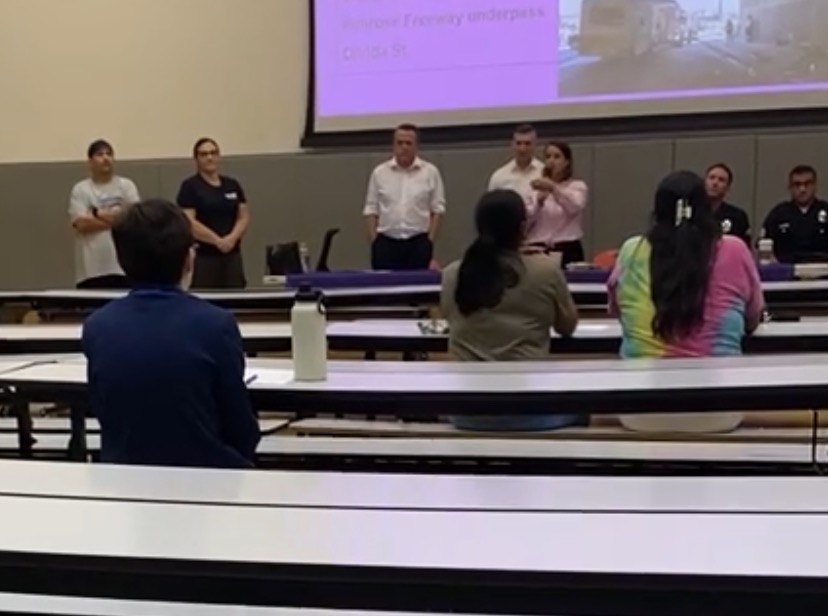Comments
SUN VALLEY TOWN HALL - On August 7, 2025, a community town hall in Los Angeles Council District 6 turned into an alarming display of political retaliation when Councilmember Imelda Padilla used her public platform to personally target and verbally attack residents. What should have been a forum for democratic dialogue instead became a chilling warning: speak out, and you will be shamed.
The meeting, ostensibly about the controversial $9.4 million Tiny Home Village project planned for the Sun Valley Metrolink station, was billed as an opportunity for transparency. In reality, it was political theater. Decisions were already finalized before a single resident entered the room. The “public engagement” was nothing more than a procedural fig leaf designed to give the illusion of consultation while concealing the absence of timely, meaningful outreach.
Witnesses say Padilla’s hostility escalated when one resident questioned the project’s planning process. Rather than respond with facts, she launched into inflammatory, personal remarks - an unmistakable act of retaliation against protected speech. “The language and behavior were clearly retaliatory and meant to intimidate,” said one attendee, who asked to remain anonymous out of fear of retribution.
The hostility wasn’t limited to that exchange. Residents raising their hands were ignored. Others, frustrated at being shut out, spoke up during Padilla’s remarks - only to be threatened with removal by law enforcement. These tactics sent a dangerous message: public meetings are not for listening, they are for silencing dissent.
Padilla’s own words reinforced that view. She openly told the audience she did not need community approval to move forward with the Tiny Home project and would do so regardless of opposition. That statement struck many as not just undemocratic, but contemptuous of the people she was elected to represent.

The meeting’s process itself was a masterclass in exclusion. Attendees were told to submit written questions on cards for a public Q&A. Padilla allegedly cherry-picked friendly questions while discarding those critical of the project or her leadership. Multiple residents confirmed their questions were never addressed.
Legal advocates point to serious concerns:
- Possible Brown Act violations, as the law guarantees the public the right to participate in local government without manipulation or suppression of dissent.
- Potential First Amendment infringements, as targeting and shaming constituents for their viewpoints may amount to retaliation against protected speech.
“This isn’t routine politics - it’s a misuse of power,” said one community member. “No elected official should use their position to intimidate the very people they were elected to serve.”
Community leaders and advocacy groups are now demanding immediate accountability:
- An independent investigation by the Los Angeles Ethics Commission, City Attorney, and Attorney General’s office.
- A formal apology and public retraction from Padilla.
- Policy reforms mandating training for public officials on safeguarding civic participation.
- A public record and response to all unanswered questions within 30 days.
If city leaders fail to act, residents say they will escalate - contacting civil rights organizations such as the ACLU, engaging the media, and exploring legal action.
What happened in Sun Valley is a case study in how power can be weaponized to marginalize the very voices it is supposed to amplify. Under the banner of a “mayor’s emergency crisis,” elected officials can bypass normal safeguards, sidestep community review, and ram through projects regardless of public harm. It’s a loophole that invites abuse, and on August 7, 2025, it was exploited in full view of the people.
This is bigger than one project or one councilmember. If officials can publicly shame constituents, ignore their questions, and bulldoze community opposition without consequence, the question is no longer whether the system is broken - it’s whether there is any system left at all.
(Mariam Moore is the CEO of The Climate Corps Initiative (TCCI), the first environmental non-profit organization dedicated to advocate for environmental justice in Sun Valley and adjacent areas. She is also a resident of Sun Valley, community and public health advocate, and an environmental activist. She is a volunteer at CPAB and a public servant.)
(Mihran Kalaydjian has over twenty years of public affairs, government relations, legislative affairs, public policy, community relations and strategic communications experience. He is a leading member of the community and a devoted civic engagement activist for education spearheading numerous academic initiatives in local political forums.Mihran is also the President of Industrial Intermediates & Infrastructure of TCCI).






